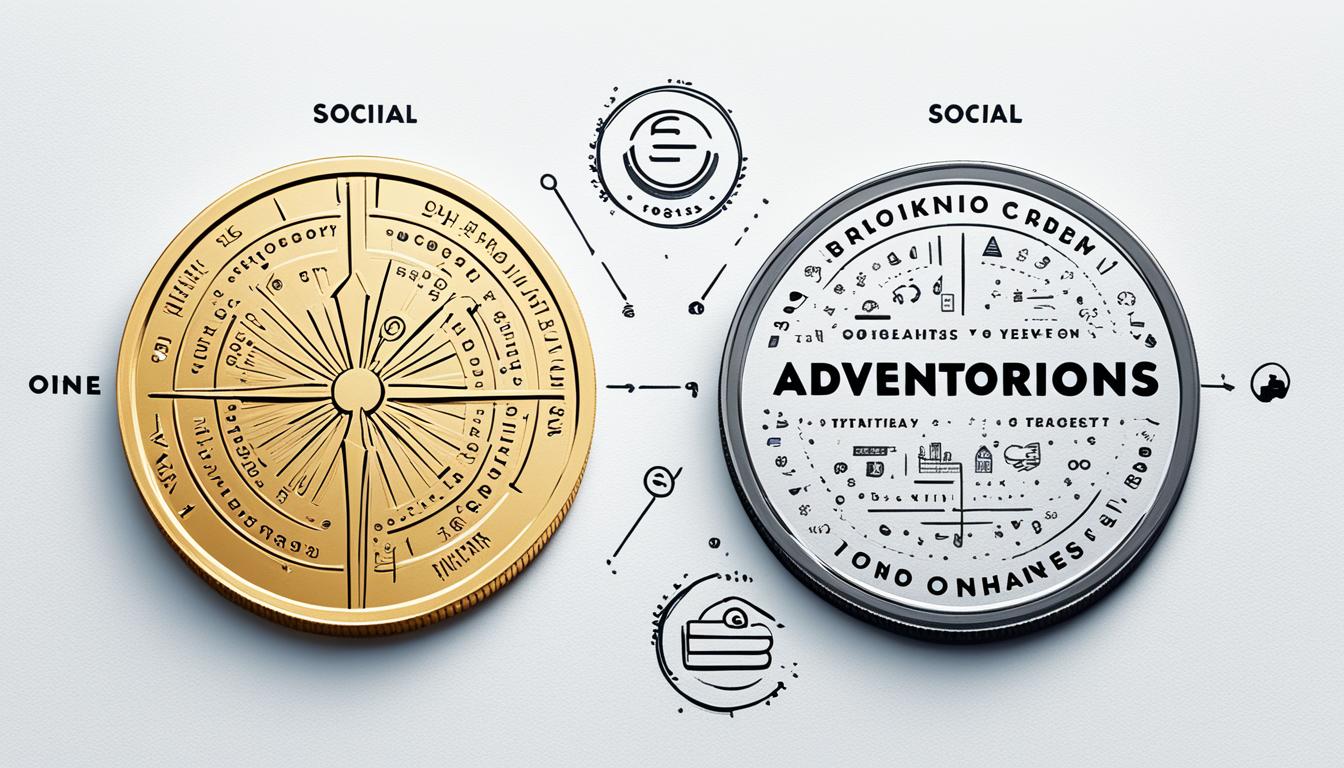Generational marketing is a strong approach. It lets marketers craft their efforts to fit different generations. These efforts are based on each group’s unique traits, likes, and common experiences. Businesses can truly connect with various age groups like Baby Boomers, Gen X, Millennials, and Gen Z this way. Each generation has its own set of values and actions. These deeply affect how they buy things and interact with brands.
When marketing to different generations, it’s vital to grasp their demographics, views, and how they like to talk. Take Baby Boomers, born from 1946 to 1964, for example. They stick to brands they love and like old-school ads. Millennials, born from 1977 to 1995, on the other hand, look for realness. They love content made by users like themselves.
By aiming at different age groups with tailored marketing strategies, companies can speak to their audience effectively. This boosts their marketing work.
Key Takeaways:
- Generational marketing targets different age groups based on their unique traits and likes.
- Knowing what each generation prefers in marketing is key to making campaigns that matter.
- Baby Boomers, Gen X, Millennials, and Gen Z all have their own values and actions that shape their buying choices.
- Tailoring marketing strategies for different generations can up engagement and bring better results.
- Keeping up with generational trends helps adjust marketing ways and truly engage every age group.
What is Generational Marketing?
Generational marketing targets specific groups by dividing them into different generations. These groups are based on when they were born. Every generation has unique beliefs, preferences, and shared experiences. These aspects greatly shape how they think, act, and how they decide to buy things.
The way each generation views the world is influenced by technological developments, financial stability, and educational exposure. Knowing about these differences helps marketers. They can create strategies that speak directly to each group.
Generational Breakdown
Different age groups react differently to marketing. Targeting everyone at once can be ineffective. To truly reach each generation, it’s essential to know what makes them tick.
The Silent Generation
Those born between 1928 and 1945 are part of the Silent Generation. They like things simple and clear. Using straightforward messages is key to connecting with them.
Baby Boomers
Baby Boomers were born between 1946 and 1964. They love a good deal and are loyal to brands. They trust traditional ads like print, radio, and TV. Focus on showing them promotions and a brand’s strong history.
Generation X
Generation X includes those born from 1965 to 1979. They question brands more than others. They like nostalgia and hearing what others think. Use real stories and a touch of the past to appeal to them.
Millennials
Millennials, or Generation Y, were born between 1980 and 1995. Being real and getting recommendations matter to them. They’re all about digital and social media. Aim to create content that’s true to life and engage with them online.
Generation Z
Generation Z, born from 1996 to 2012, is tech-savvy and aware of social issues. They care about their finances and listen to online reviews. Use social media and influencers to reach them. Also, highlight causes they believe in.
| Generation | Characteristics | Priorities | Effective Marketing Strategies |
|---|---|---|---|
| The Silent Generation | Values simplicity and straightforward content | Simple and concise messaging | Clear communication with minimal distractions |
| Baby Boomers | Motivated by good deals and brand loyalty | Discounts and loyalty programs | Traditional advertising methods, emphasizing brand reputation |
| Generation X | More skeptical of brands, values nostalgia and word-of-mouth | Nostalgia and personal recommendations | Word-of-mouth marketing, testimonials, and authenticity |
| Millennials | Value authentic brand messaging and word-of-mouth | Authenticity and relatability | Influencer marketing, social media engagement, genuine content |
| Generation Z | Technologically advanced and socially conscious | Tech-savvy and financially stable | Social media marketing, influencer collaborations, cause-based marketing |
Marketing to Baby Boomers
Baby Boomers, born between 1946 and 1964, are a key market for marketers. They have special traits and a lot of buying power. This group has seen a lot of economic growth. They also have the most money to spend compared to other ages.
Baby Boomers lived through prosperous times. They love getting good deals and discounts. They are very loyal to brands they know and trust. For marketing success, firms should use old-school ads like in magazines, on the radio, and TV.
Offering discounts and special deals works well with Baby Boomers. They like loyalty programs and customer service that helps build a bond. These marketing moves help brands win over Baby Boomers. This lets brands tap into their large spending power.
Benefits of targeting Baby Boomers:
- Strong purchasing power and discretionary income
- Brand loyalty and trust
- Engagement with traditional advertising methods
- Preference for discounts and good deals
- Opportunity to build long-term customer relationships
Marketing strategies for Baby Boomers:
| Marketing Strategy | Description |
|---|---|
| Discounts and Incentives | Offer exclusive discounts and incentives to attract Baby Boomers with their preference for good deals. |
| Loyalty Programs | Implement loyalty programs to reward Baby Boomers for their brand loyalty and encourage repeat purchases. |
| Traditional Advertising | Utilize traditional advertising methods such as print, radio, and TV to reach and engage with Baby Boomers. |
| Customer Service | Focus on providing excellent customer service to build strong relationships with Baby Boomers. |
Marketers can really connect with Baby Boomers by understanding what makes them unique. Using their loyalty and buying power, brands can make ads that touch Baby Boomers. This can boost sales.
Marketing to Generation X
Generation X, born between 1965 and 1976, grew up during a time of economic challenge. They are known for being independent and self-reliant. These traits shape how they interact with brands and make purchasing decisions.
They question marketing messages because they grew up in uncertain times. This group prefers advice from friends and family. They are drawn to what is real and enjoy reminders of the past in brands.
To reach them, use familiar advertising like TV, radio, and print. These methods remind them of the past. Discounts and loyalty programs also work well to keep them coming back.
Be clear and straight-forward with them. They value honesty. Making purchases easy, through well-designed websites for example, makes them happy. Email marketing that feels personal and direct can also be effective.
Successfully engaging Generation X means understanding their doubts. Highlight nostalgia and recommendations from loved ones, and stick with traditional advertising. By focusing on what makes Generation X unique, brands can build long-term loyalty.
Key Characteristics of Generation X:
- Skepticism towards brands
- Value nostalgia and word-of-mouth recommendations
- Respond well to traditional advertising
- Appreciate loyalty programs and incentives
- Clear and honest messaging
- Preference for easy paths to purchase
- Effective email marketing campaigns
Marketing Strategies for Generation X:
- Utilize traditional advertising methods (TV, radio, print)
- Incorporate loyalty programs and incentives
- Evoke nostalgia and utilize word-of-mouth recommendations
- Provide clear and honest messaging
- Optimize paths to purchase for easy transactions
- Implement targeted email marketing campaigns
Table: Marketing Strategies for Generation X
| Marketing Strategies | Description |
|---|---|
| Utilize traditional advertising methods | Television, radio, and print advertisements evoke nostalgia and familiarity. |
| Incorporate loyalty programs and incentives | Offer discounts, coupons, and loyalty rewards to capture attention and foster brand loyalty. |
| Evoke nostalgia and utilize word-of-mouth recommendations | Tap into Generation X’s appreciation for the past and leverage the power of personal recommendations. |
| Provide clear and honest messaging | Transparency and straightforward communication resonate with Generation X. |
| Optimize paths to purchase | Create user-friendly websites and convenient e-commerce platforms for easy transactions. |
| Implement targeted email marketing campaigns | Direct communication and personalized offers through email resonate with Generation X. |
Marketing to Millennials
Millennials, also known as Generation Y, are the largest generation, born from 1977 to 1995. It’s key to understand their preferences for effective marketing. This group looks for honesty and realness in brands and advertising.
Millennials care a lot about authenticity. They lean towards brands that are truthful in their messaging. This generation values genuine products and experiences a lot.
User-generated content (UGC) is big with Millennials. They trust what their friends say about products. Using UGC in ads builds trust and shows credibility to them.
To reach Millennials, use many different marketing strategies. Effective ones include multichannel, influencer, social media, and content marketing. This approach can help connect with them on various platforms.
Influencer marketing:
- Work with popular people online who appeal to Millennials to boost your brand’s trust and awareness.
- Influencers make relatable content that sparks interest in what you’re offering.
- Pick influencers who share your brand’s values to target Millennials effectively in your market.
Social media marketing:
- Millennials are always on social media.
- Make content they’ll want to share with friends to grab their attention.
- Chat, reply quickly, and be active online to make them loyal to your brand.
Content marketing:
- Create content that Millennials find valuable and interesting.
- Give them useful advice, tips, and answers they’re looking for.
- Share free stuff like e-books or guides to keep them engaged and trust your brand.
Brands that support causes, offer good prices, and are strong online attract Millennials. By focusing on realness, using UGC, and many marketing ways, you can connect with this important group and grow your business.
Marketing to Generation Z
Generation Z, born between 1996 and 2012, is diverse and tech-savvy. They use technology in all parts of their lives, including shopping. Marketers need to get to know their unique traits and likes.
They rely heavily on social media. Sites like Instagram, Snapchat, and TikTok are where they find new things to buy, read reviews, and talk to brands. So, adding social media to marketing plans is key for reaching them.
Generation Z cares a lot about their money and spends wisely. They research and read reviews before buying anything. Using testimonials and working with influencers can build trust and credibility.
This generation likes short videos more than long content. They lose interest fast and like quick, engaging content. Short videos that show what a product or service does can work well.
They also care deeply about social and economic issues. They like brands that share their values and try to make a difference. Adding these issues into marketing can catch their attention and keep them interested.
To market to Generation Z, you need to really understand their tech-savvy, love for social media, focus on spending wisely, preference for short videos, and care for social causes. Brands that use these ideas in their strategies can connect and make lasting relationships with Generation Z.
| Marketing Strategies | Description |
|---|---|
| Influencer Marketing | Collaborating with popular social media influencers to promote products and services. |
| Reviews | Encouraging satisfied customers to leave positive reviews and testimonials. |
| Videos | Creating short, engaging videos to showcase products and explain features. |
| Mobile Interactions | Optimizing marketing campaigns for mobile devices to reach Generation Z on the platforms they frequently use. |
| Social Selling and Advertising | Utilizing social media platforms for direct selling and targeted advertising. |
Additional Considerations for Generational Marketing
When planning marketing strategies for different ages, it’s crucial to look beyond generational traits. It’s not enough to focus solely on age groups. Other factors like location, income, interests, and actions should shape your campaigns too.
Understanding what different generations share is key for successful marketing. Knowing common experiences and values helps. Themes like caring for the environment and being socially responsible matter to everyone. Integrating these themes into your marketing can attract a wide audience.
However, thinking all people in a generation are the same is a mistake. Even if trends exist, individuals within a generation can have varied opinions and lifestyles. Acknowledge this diversity for better marketing results.
To avoid the pitfalls of generational marketing, deep research is necessary. This research helps you see beyond stereotypes. Then, you can craft strategies that truly speak to your audience.
Pros and Cons of Generational Marketing
Generational marketing, like all strategies, has its ups and downs. Knowing these can guide your marketing decisions. Recognizing the benefits and challenges helps you decide if this approach fits your goals and your audience.
| Pros of Generational Marketing | Cons of Generational Marketing |
|---|---|
| Allows targeted messaging to resonate with specific age groups | May overlook individual preferences within a generation |
| Recognizes the different value systems and experiences of each generation | Can result in oversimplification of complex consumer behaviors |
| Facilitates personalized marketing experiences | Requires extensive research and data analysis |
| Enhances brand authenticity and connection with target audience | Potential for generational stereotypes and biases |
Generational marketing can connect you with various age groups effectively. But weighing its advantages and limitations is important. Reflecting on these points helps build marketing strategies that truly resonate with your targeted groups.
Conclusion
Generational marketing helps reach different age groups effectively. It focuses on each generation’s unique traits and preferences. This approach leads to more impactful marketing campaigns.
Using real examples and insights can guide marketers in creating winning strategies. It’s about connecting with each generation in a way that resonates.
To target each generation well, marketers need to keep up with trends. Tailoring messages and channels for each age group improves engagement. Strategies vary from loyalty programs for Baby Boomers to influencer marketing for Millennials.
At its core, generational marketing fosters connections across age groups. It appreciates the varying preferences and behaviors across generations. This approach not only boosts brand loyalty but also ensures marketing success.
With the right knowledge on generational dynamics, companies can craft effective strategies. This enables them to meet their marketing objectives proficiently.




